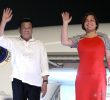DAVAO CITY – Eastern Mindanao Command chief Major General Leonardo Guerrero admitted that there are politicians who were already approached by the New People’s Army to collect permit-to-campaign (PTC) fees.
Guerrero, however, opted not to name the political candidates to protect their reputation.
“But we choose to withhold the information. We would not like to unnecessarily or unduly damage the reputation of the good politicians,” Guerrero said in a press conference here Wednesday.
Guerrero said the PTC is a form of “extortion”activity by the NPAs during the election.
He said they are now coordinating with the candidates to work out schedules “to clear” the areas prior to campaign period.
“That’s why we are appealing to our candidates to work closely with us and the (Philippine National Police) to schedule their campaign sorties. What will happen is, we will clear the area before they go to the barangay,” said Guerrero.
For those running for national positions, the campaign period is set 90 days before the election day or on February 9 and 45 days before the elections for local positions, which falls on March 25.
Guerrero also encouraged politicians to report to them should they receive demand letters from the New People’s Army so they can provide security.
“Our immersions in barangays are ongoing to strengthen our security system. We are closely coordinating with the PNP,” he said.
However, Guerrero clarified that they will only be providing security service in the area for the politicians and will leave the area during campaigns to avoid being misunderstood that they are supporting a certain candidate.
“We would not want to be misunderstood as campaigning or supporting a particular individual that’s why we only provide security,” he said.
During the elections in 2010, the Communist Party of the Philippines (CPP) said the permit-to-campaign policy of the revolutionary movement is about “respecting the authority of the People’s Democratic Government and protecting the rights of the people.”
“By securing their permits to campaign, candidates and their campaign personnel are expected to act in accordance with prevailing policies that protect the democratic and human rights of the people,” the CPP explained.
“This policy has in fact succeeded in protecting the rights of the masses in revolutionary areas against violence, coercion and abuse by warlords and armed politicos.”
The CPP added that:“The policy requires candidates to coordinate their activities with local organs of the People’s Democratic Government. Candidates are also prohibited from being escorted by armed contingents in revolutionary areas.”
“These policies have been instrumental in reducing the political violence and abuse of human rights by politico-warlords,” it said.
In its statement during the 47th year founding anniversary of the CPP on December 26 last year, the National Democratic Front (NDF), the political arm of the CPP said from 40 guerrilla fronts during the first year of the Aquino administration in 2010, the NPA forces have expanded to 46 guerrilla fronts scattered in five regions in Mindanao.
NDF Mindanao spokesperson, George Madlos, also known as Ka Oris, said they operate in 200 cities and municipalities. He said that in 2010, they operate in 1,850 villages, but now they cover 2,500 villages.
Madlos said the mass base of the NPA has grown to 200,000 from 130,000 in 2010. (davaotoday.com)










